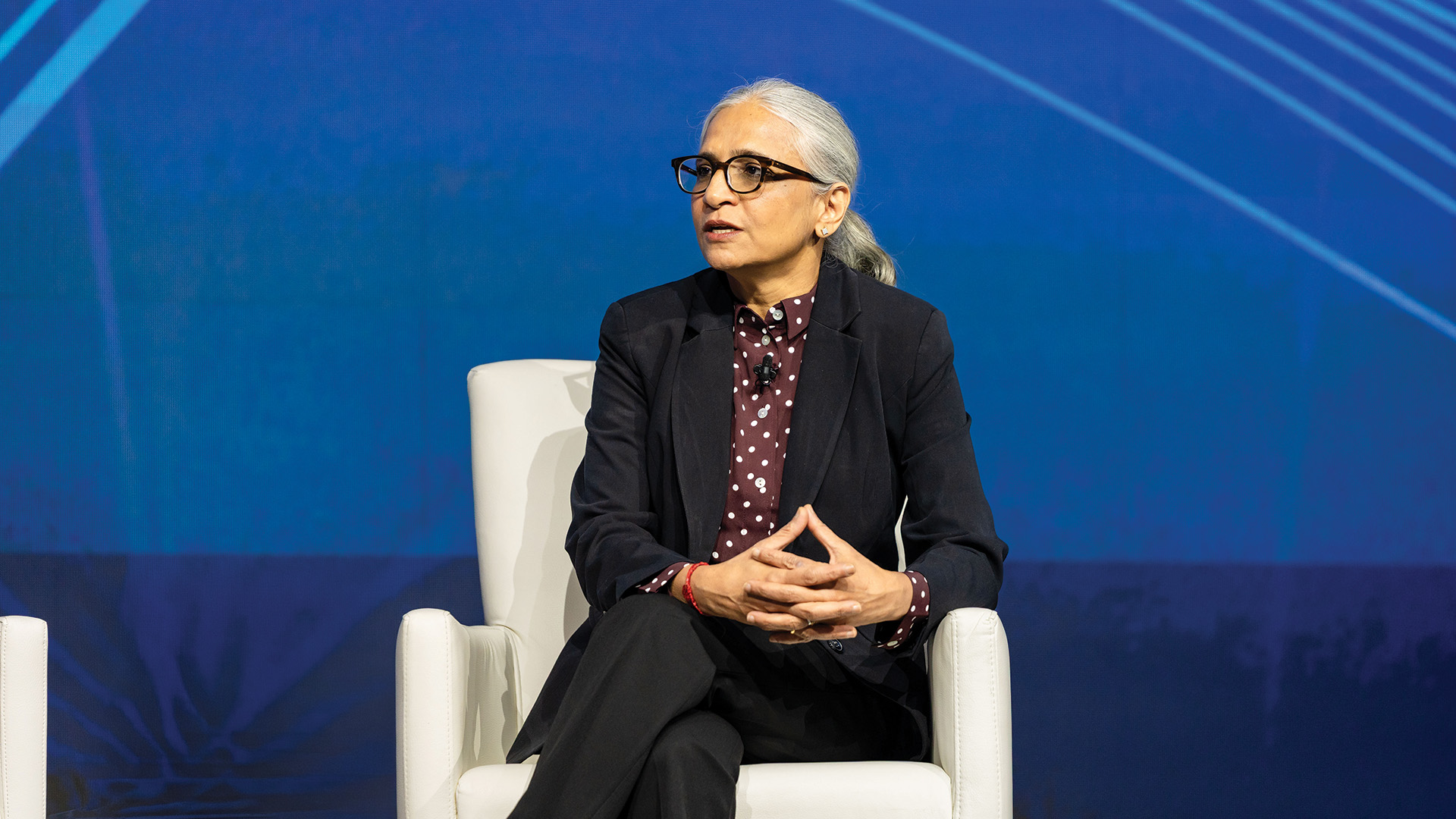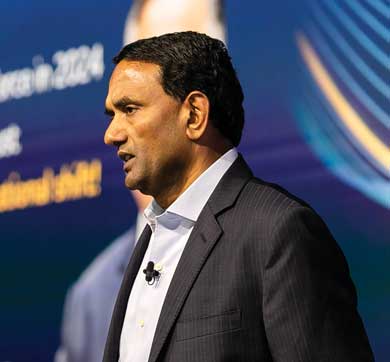November 2025 | 2785 words | 11-minute read
Aarthi Subramanian, Executive Director – President and Chief Operating Officer, elaborates on how TCS is broadening its leadership in emerging technologies, sharpening its AI focus, and driving good through technology, in areas like healthcare, citizen services, and CSR.
Excerpts from the interview:
You have transitioned from being the Group Chief Digital Officer (CDO) at Tata Sons to being Chief Operating Officer at TCS. How does this unique cross-Group experience shape your vision for TCS’ transformation?
It was a privilege to serve as the Group Chief Digital Officer at Tata Sons, enabling the vision of our Chairman, of making the Group companies technology leaders in the sectors they operate in, embracing the full power of digital, AI, and next-gen technologies. It gave me a unique vantage point to engage with companies across vastly different industries, ranging from manufacturing to consumer-facing businesses.
What became clear was that digital transformation succeeds when it goes beyond technology adoption to creating value for the business. This also requires that companies create strong enterprise technology systems, invest in data capabilities, which form the foundation for digital transformation. As a team, our focus was to shape initiatives to enhance customer experience, drive the next level of operational excellence, and create differentiated products and services. We designed programmes to cater to company-specific needs, industry-level opportunities and One Tata synergies. Leveraging the power of partnership ecosystems was a key part of our approach.
Tremendous learnings from engaging with Group companies now informs my work at TCS, with multiple industry perspectives that are directly relevant to TCS’ client base. As COO, I see our role as not simply delivering technology services but also focusing on outcomes-based transformations for our customers. TCS’ scale presents unique opportunities to integrate our diverse set of services, cloud, data, AI, enterprise SaaS solutions, cybersecurity, next-gen design services and business process services to help clients modernise at scale and speed.
For decades, TCS has been the preferred partner to its clients for technology needs — from mainframes in the 1970-80s to digital solutions between 2015-25. Our stated ambition is to make TCS the largest AI-led technology services company. We are relentlessly focused on helping our clients navigate this unprecedented AI transition and collaborating to deliver real and tangible value.
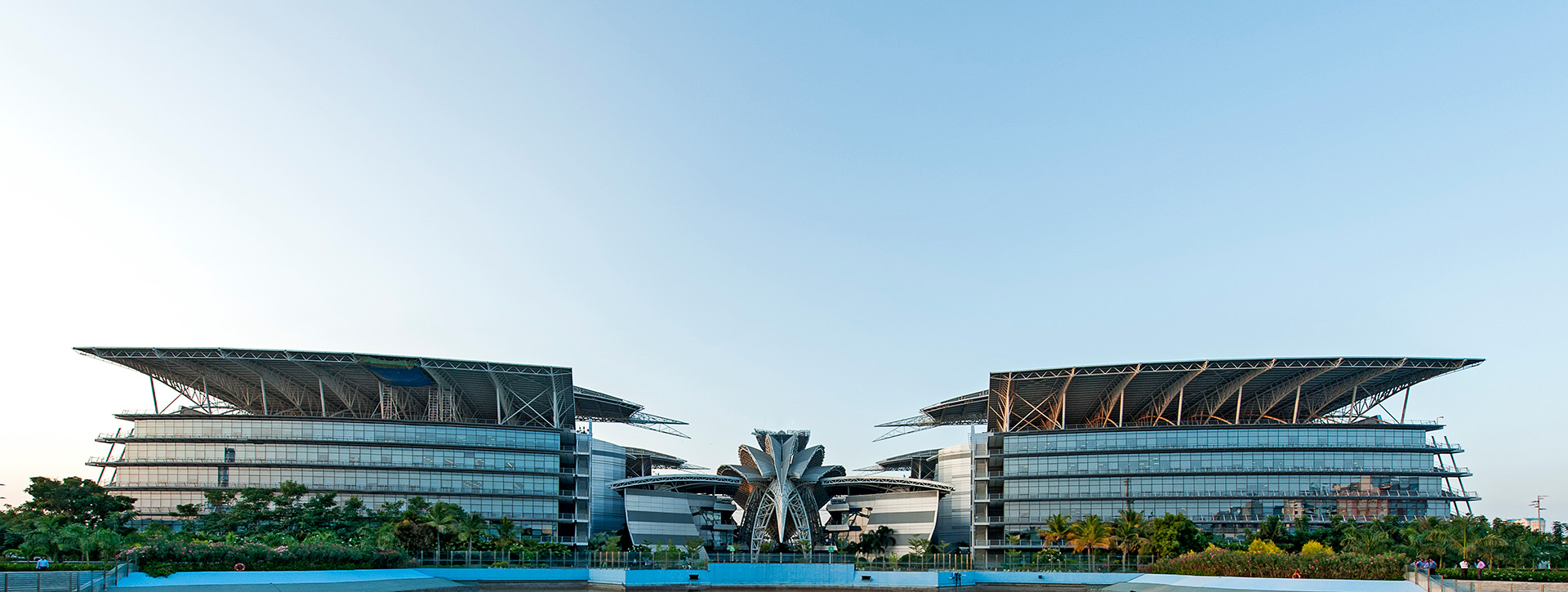
From your view at the helm of all the service lines, how is TCS broadening its leadership in emerging technologies and enhancing seamless integration across service offerings?
This technology wave is very unique, in that every industry has significant potential to benefit from AI. But it also has significant implications for TCS in terms of how we deliver services to our customers. Every service we deliver has to be redefined with an AI-first approach. For instance, software engineering, IT operations, etc.
We have created a Human+AI framework with five levels of autonomy, which provides the blueprint for every service line to be redefined. This is similar to the five levels of autonomy that we are so familiar with now in autonomous cars. With AI capabilities rapidly evolving, the path to realising higher levels of autonomy will continuously emerge. We are also investing in scaling up our capabilities in every service line with a deeper focus on partnerships and acquisitions.
“TCS is at the forefront of making investments in agentic AI. We are embedding agentic AI into industry-specific accelerators that allow near out-of-the-box deployments closely aligned with business goals.”
Equally important is services integration. Clients don’t experience AI, cloud, or cybersecurity as separate streams; they experience transformation as a whole. We aim to enable our service lines to work seamlessly together, bringing the full power of our technology, domain expertise, and ecosystem partnerships to bear. This convergence allows us to deliver transformation that is customer-centric and outcome-focused. It positions TCS not just as a service provider, but as a trusted end-to-end partner helping enterprises navigate an era defined by rapid technological change.
We are establishing our leadership in emerging technologies by making forward-looking investments in research and embedding those advances directly into client solutions. Whether it is GenAI, sovereign cloud, cybersecurity, or quantum computing, our approach is to build strategic capabilities early, validate them through industry-specific pilots, and then scale them responsibly across enterprises. This ensures that innovation is tied to measurable business imperatives.
Which industries, trends, and technologies are driving growth and transformation for TCS in FY26? What do you view as the big challenges in that period?
In FY26, we expect growth to be driven by AI and data, enterprise SaaS implementations, cloud adoption, and cybersecurity. The opportunities are broad-based across industries. Vendor consolidation, agentic business process services and AI-led tech modernisation are gaining traction across our customer base. At the same time, softness in tech spending, slower client decisions, and ongoing macroeconomic uncertainty present persistent challenges.
As AI reshapes productivity, we must also reskill talent and manage workforce transitions. We aim to address these challenges with adaptability at the core, while continuing to invest in both technology and people for long-term growth.
How is TCS leaning into the AI inflection point reshaping the global business landscape?
There is unanimous acceptance of the power and promise of AI. Our customers are optimistic about the impact that AI can create in their business but also clear that this transition needs to be done safely and securely. Every enterprise leader I speak with today understands that investing in AI is not optional but essential to remain competitive for the future. This inflection point is reshaping industries by redefining productivity, customer experience, and the economics of entire value chains.
TCS is helping clients navigate this shift with a clear road map. We believe that enterprises need to approach AI as a culture change initiative. This means putting AI tools in the hands of every employee and helping them understand and appreciate the power of the technology. At TCS, we have done just that. We have created an AI infrastructure that is available to every employee — this includes access to AI models, coding tools and AI application building tools. In addition, we are investing heavily in reskilling, so our people can lead clients through this transformation. As of date, 160,000 TCSers have acquired higher order AI skills; this has increased 2X in the last 12 months.
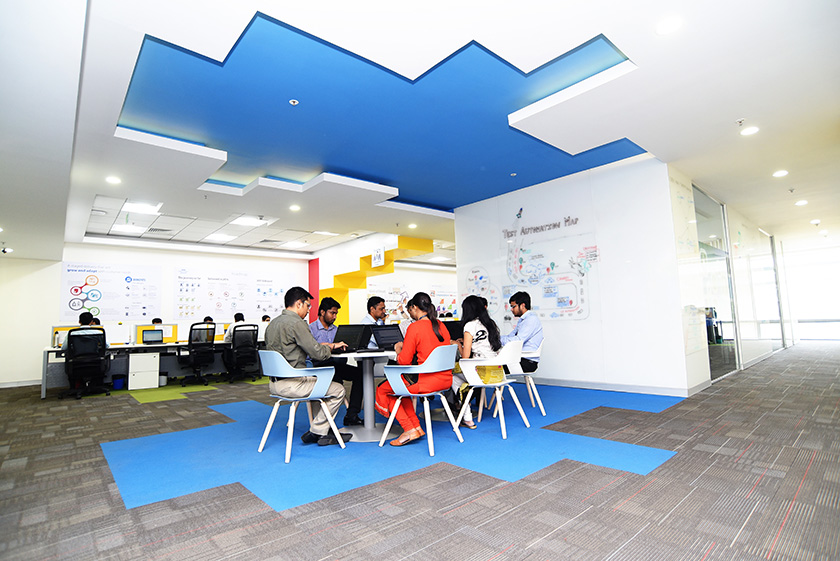
We are proactively engaging with our customers to bring AI close to them and make it real. AI Innovation Days and Rapid Build with AI are some of the interventions that are designed to shape and build high-value ideas and productionise in short cycle times. We are also focusing on industry-specific AI adoption, building agentic AI accelerators that can be deployed responsibly and at scale. Our role is to not just implement AI but to help enterprises adapt and adopt responsibly, reimagine their business models, and uncover new opportunities for growth and value creation.
External validation of our efforts is equally important. Leading analyst firms, including Gartner, Avasant, Everest, IDC, HFS, PAC, etc, now recognise TCS as a ‘Leader’ in AI and GenAI services, showing us that we are on the right path and need to keep accelerating and building capability.
The Chairman has said that TCS is “proactively leading this change”. What are the steps TCS has taken to make this happen?
We are witnessing the maturing of GenAI from exploration to execution, where deployments must deliver results and not just serve as experiments. In 2025, we see a clear shift from pilots to RoI-led scaling of GenAI. The trifecta of traditional AI, GenAI and agentic AI coming together is creating this momentum. Our ability to rapidly build solutions with high accuracy is delivering business value to our customers, resulting in production implementations that are ready for scale.
TCS is at the forefront of making investments in agentic AI. We are embedding agentic AI into industry-specific accelerators that allow near out-of-the-box deployments closely aligned with business goals. These capabilities make it possible to move projects quickly from pilot to production, while ensuring that they deliver measurable value in areas like operations automation, customer engagement, and supply-chain decision-making.

TCS is now focused on delivering new, higher value, outcome-based services to our clients through a Human+AI operating model, deepening our domain-based AI solutions, on all fronts; investing in data centres and cloud infrastructure (including sovereign cloud) to better meet the evolving needs of our clients, and forging industry-best partnerships with pure-play AI firms, hardware providers, and AI startups.
We have scaled our investments in TCS Pace Ports, which are our innovation hubs across key geographies, to bring real-world experiences of AI closer to our customers.
Internally, we are institutionalising AI through a series of acceleration initiatives under one cohesive banner of tcsAI. It is our company-wide initiative which ensures every function and employee has access to advanced tools, from enabling developer environments and GenAI-powered processes to ethical, creative applications. A cornerstone of this effort is the tcsAI Hackathon, which encourages employees from all functions to tackle practical business problems using AI. Alongside this, our AI Fridays, held in-person, create a collaborative space for experimentation and innovation with AI technologies. The recently concluded tcsAI Hackathon is the world’s largest hackathon that brought together 280,000+ TCSers to ideate and build with AI. What is truly an industry first is that 500,000+ submissions were evaluated by AI with human-in-the-loop, tremendously cutting down the time taken for selecting top entries.
We have also announced a new AI and Services Transformation unit to accelerate and scale our efforts on AI, and just a few weeks ago, I appointed TCS’ first ever Chief AI and Services Transformation Officer.
“This unique combination of forward-thinking partnerships, strategic investments in talent and infrastructure, and a focus on industry-specific solutions has cemented TCS’ role as a leader, enabling us to shape the future with confidence and vision.”
What prompted the formation of this new unit? How will it reshape your approach to delivering AI-driven services globally?
Our decision to consolidate AI and data capabilities into a dedicated AI and Services Transformation Unit was driven by a strategic need to respond decisively to the accelerating AI momentum. This new unit will integrate all our existing teams and capabilities in AI and work closely with all other service lines as well as industry business groups to scale our impact and enable benefit realisation at scale for our clients.
This includes reinvigorating our service propositions, deepening our AI domain solutions, orchestrating new partnership ecosystems, and accelerating rapid innovation in the delivery of AI-powered integrated technology services across operations, engineering, and modernisation.
Our current AI and Data unit has become a part of this new organisation. By bringing together all existing AI functions under one umbrella and placing a veteran leader at its helm, we have ensured heightened focus at the top. This move elevates TCS’ capacity to deliver AI-driven services with speed and impact across geographies.

How is TCS deepening AI and data partnerships across hyperscalers and native AI and data companies? How are these shaping your AI offerings?
We are developing an ecosystem-led AI strategy with hyperscalers like Microsoft, AWS, and Google, while integrating emerging model innovations and launching innovative cloud and AI services in multiple industry verticals.
With deep tech AI partners like NVIDIA, we have established a specialised division that fuses their cutting-edge technologies with our deep industry knowledge, delivering tailored AI solutions in areas like telecommunications, manufacturing, and banking and financial services. We have over 12 industry-specific solutions launched on NVIDIA platforms, including a quadruplet that is revolutioning health and safety monitoring in warehouses.
In addition, we have integrated AI into our own platforms like TCS BaNCS™, TCS MasterCraft™, TCS Optumera™, and TCS Clever Energy™, empowering organisations to accelerate innovation, automate processes at scale, and achieve tangible business benefits.
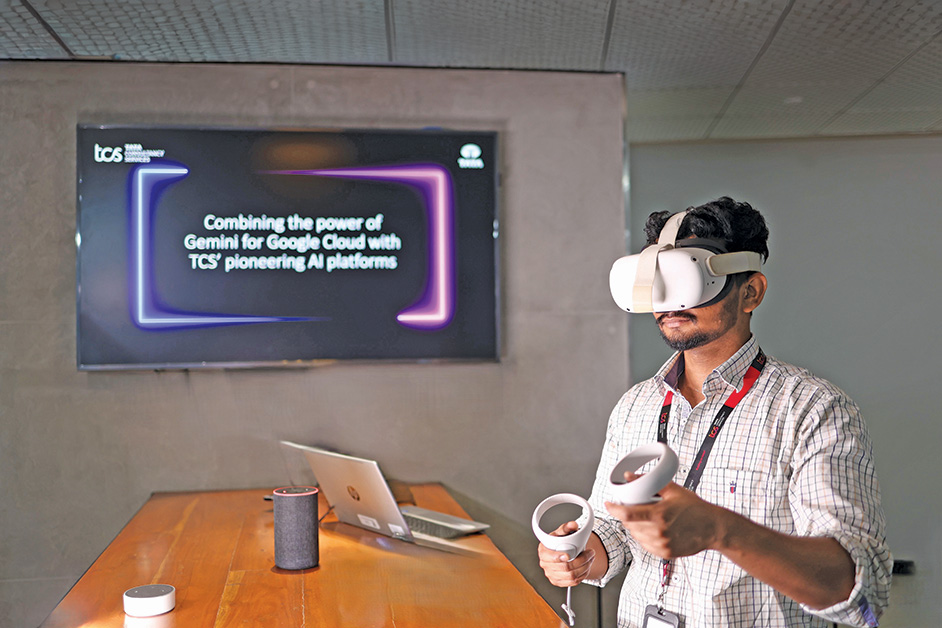
This unique combination of forward-thinking partnerships, strategic investments in talent and infrastructure, and a focus on industry-specific solutions has cemented TCS’ role as a leader, enabling us to shape the future with confidence and vision. Overall, we have implemented 3,000+ AI engagements with our clients. In manufacturing and logistics, AI accelerators are optimising supply chains. In healthcare, document intelligence is improving clinical outcomes. In telecom, AI-native solutions are powering digital twins and smarter networks. In banking and financial services, we have set up an AI office for our clients like Lloyds Banking Group and Erie Insurance.
This robust network of alliances has been pivotal in propelling our advancements in AI. By blending our industry expertise with these ecosystem partnerships, TCS is not only making GenAI real for clients but also redefining how entire industries deliver value in the AI age.
What are some marquee GenAI and other transformation projects that TCS is leading within the Tata Group?
The Tata Group has been an early adopter of GenAI across industry verticals. It has been our privilege to partner with some Group companies on their AI-led initiatives.
In 2023, when GenAI was quite new, TCS partnered with Tata Chemicals to build a troubleshooting co-pilot for shop floor operators.
At JLR, we deployed a virtual agent for service technicians to transform repair workflows with faster issue resolution.
With Tata Electronics, we are leveraging our NVIDIA partnership to shape multiple projects — construction of digital twins, safety solutions, and physical AI to improve inspection processes in manufacturing locations.

With Tata AutoComp Systems, we co-developed an AI-first strategy for its seating and plastics divisions to identify key AI interventions to improve manufacturing quality and enhance workforce productivity.
Our work with Tata companies is also expanding into agentic AI. For Tata Motors, we have deployed an agentic AI solution that has significantly improved supplier experience.
Partnering with Tata Group companies offers TCS a unique opportunity to co-develop and drive early adoption of new technologies across multiple industries.
There is a lot of good that TCS drives through technology in areas like healthcare, citizen services, and CSR. Can you spotlight those unseen projects where TCS is using technology to uplift humanity — economically, socially, and environmentally?
At TCS, quiet innovation means driving real-world impact, such as the TCS ADD™ platform, which uses AI to make clinical trials faster, safer, and more efficient, improving data oversight, boosting trial agility, and reducing monitoring efforts.
We created the first-ever digital heart of a long-distance runner, combining our passion for running with innovation in digital twin technology. It’s a powerful new way for athletes to measure their health and performance and transform how they train. TCS is also part of the Living Heart Project to develop and validate realistic digital simulations of the human heart. As an industry partner, TCS will use its domain and technology expertise, and its research on the TCS Bio Digital Twin of the heart, to contribute to model refinement, simulation, and technological implementation in developing and validating highly accurate, personalised digital human heart models. The project is expected to facilitate groundbreaking medical solutions, including the use of heart simulation as a source of digital evidence for new cardiovascular device approvals.
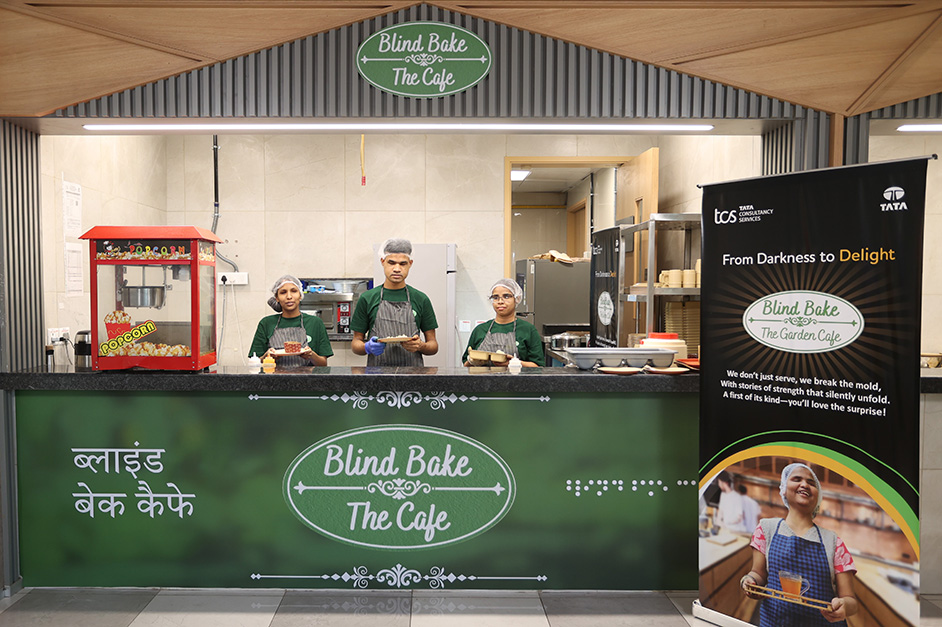
The TCS Digital Skin Twin Platform uses multiscale modelling and virtual reality for transdermal pharmaceutical and cosmetics delivery, addressing the challenges these industries face in reducing the time taken to bring new drugs to market and in developing a more ethical manner of producing cosmetics.
We have also scaled meaningful education initiatives. Literacy as a Service brings functional, digital, and financial literacy to adults using AI-powered, vernacular learning, benefiting millions across India and Africa. This programme just celebrated 25 years this year and has created significant impact across the world. Our goIT and Ignite My Future in School programmes equip millions of students and teachers globally with computational thinking for tomorrow’s challenges.
Most recently, we have launched the Blind Bake Cafe at our Olympus Campus in Mumbai. This marks the first café operated by individuals with visual impairment within a corporate campus.
These efforts reflect our deep intent to infuse technology with purpose, creating compounding benefits for communities and health systems.
You started your career with TCS and have spent most of it here. Before we wrap up, could you share your thoughts on being back at TCS and what you are looking forward to the most in this new chapter?
Returning to TCS feels like coming home while stepping into the future. I began my career here, and after my stint at Tata Sons as Group CDO, I return as COO at a moment when TCS is reimagining itself to lead in the era of AI. Being a technologist, I see this as a unique opportunity that comes with tremendous responsibility.
What excites me the most is creating impact with TCS’ scale, talent, and ecosystem for our customers, while shaping new opportunities for our people. My focus is on deepening consulting-led transformation, strengthening AI and data capabilities, and nurturing inclusive leadership so that TCS is future ready for the next era that is being redefined by AI.
—As told to Monali Sarkar




